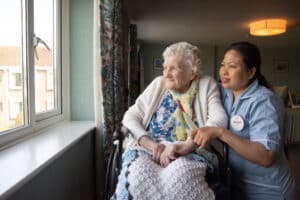When you hear the word “care home”, what springs to mind? Are your thoughts positive or negative? Care homes are often described as secluded places where older people “end up” or are “put in”.
We believe every person is an individual and deserves to be treated with respect. We each have our own life story, things we like and dislike. Unfortunately, residents living in care homes are not always spoken about with dignity.
They are sometimes referred to as “elderly”, “frail”, or even “senile” or “bedridden” when they live with a condition.

These common misconceptions help to spread myths and stem from a lack of awareness. But, more importantly, they can have a negative impact on the residents and their families.
In reality, residents living at well-equiped care homes enjoy compassionate, high-quality care, and the language we use to describe them should be accurate, respectful and free from stigma.
Here are some simple guidelines to ensure you are not spreading any misconceptions about residents’ lives in a care home. Feel free to share this with friends, family and professionals to help promote a positive and accurate image, which supports and celebrates older people.
|
Words to avoid |
Replace with |
| Elderly | Older people |
| Frail | Needs support with |
| Disease
Illness |
Condition |
| Old people’s home | · Care home
· Home |
| Facility | |
| Unit | · House
· Area |
| Wing | |
| Being put in a care home | · Moving into a care home
· Choosing a care home · In need of support |
| Allowing visits | · Welcoming family and friends
· Supporting relationships · Maintaining ties with families, friends the local community |
| Patient | · Resident
· Person · Individual |
| Suffering | Living with |
| Confined | Living in bed |
| Bed-bound | |
| Bedridden | |
| Losing independence | Receiving support for independent living |
| No longer able to contribute | · Active members of their community
· Active members of a care community · Needs support to maintain independence |
In conclusion, words shape the way we think and the way we make others feel. By choosing positive, respectful language, we can help create a culture that values and uplifts older people.
Next time you talk about care homes, challenge the stereotypes and use words that celebrate dignity, individuality, and community. Share these simple changes with friends, family, and colleagues, and together, let’s reshape the conversation about care homes for the better!

Want to learn more about the importance of positive language in our everyday life? Check out this resource on dementia:
[Summary: Care homes are often misunderstood, with outdated terms reinforcing negative stereotypes. In reality, they are vibrant communities where older people can receive compassionate, high-quality care.
The words we use matter; they shape perceptions and can either uplift or stigmatise residents. Instead of terms like “frail” or “bedridden”, we can say “needs support” or “living in bed.” Instead of “being put in a care home”, we can say “moving into a care home.”
By choosing respectful, empowering language, we help promote dignity and challenge misconceptions. Let’s start using words that celebrate individuality and community. Together, we can change the conversation about care homes for the better!]